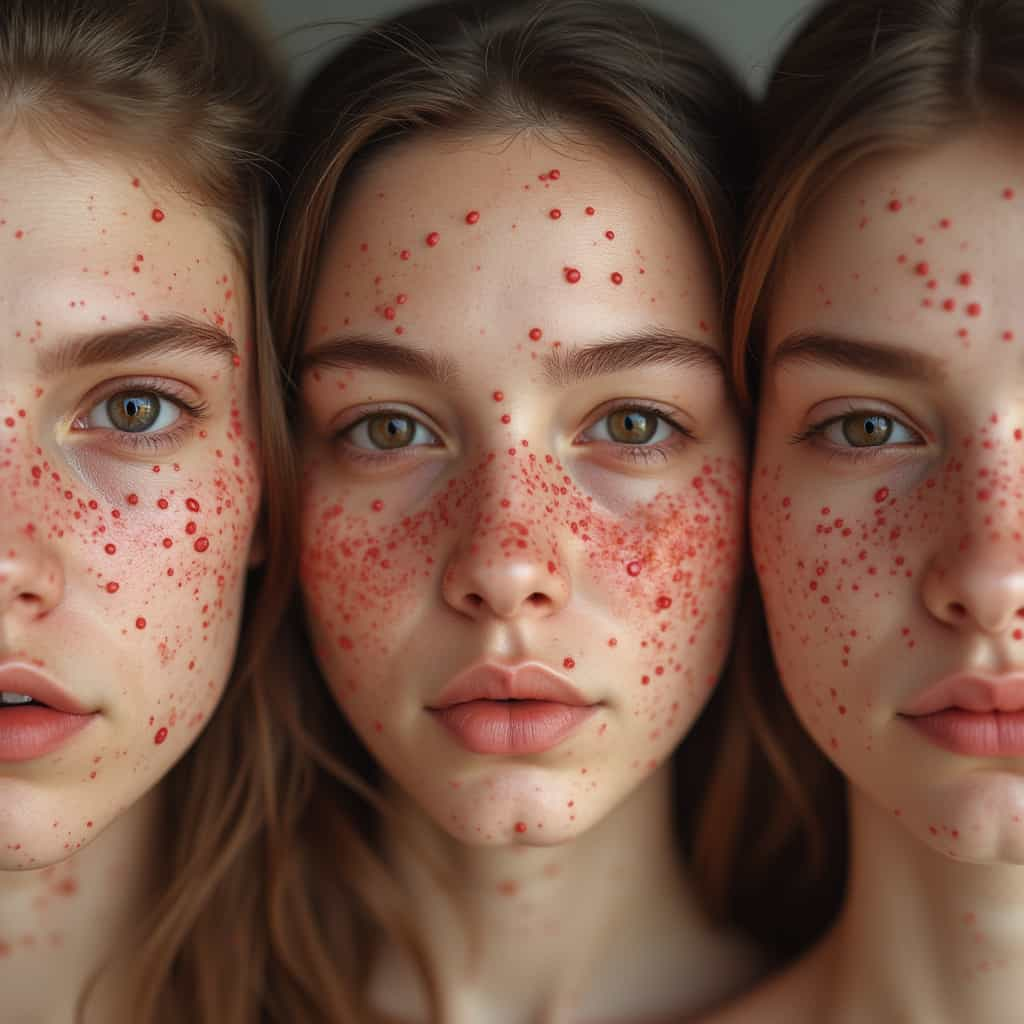Acne is a pervasive skin condition that plagues individuals across the globe, from hormonally charged teenagers to stressed-out adults. Characterized by the appearance of pimples, blackheads, and cysts, acne can cause not only physical discomfort but also emotional distress. Dr. Jane Patel, a leading dermatologist, states, ‘Acne is more than a skin condition; it affects one’s self-esteem and mental health significantly.’ The hormonal fluctuations in teenagers often lead to increased sebum production, clogged pores, and the development of acne. However, it does not discriminate, affecting approximately 50 million people in the United States alone each year, according to the American Academy of Dermatology.
The regional prevalence of acne varies. In Western countries, it is estimated that 85% of people aged 12 to 24 years experience at least minor acne. Meanwhile, in certain rural societies, lower incidences have been observed. Interestingly, this might be linked to lifestyle and dietary differences. Dr. John Smith, a nutritionist, suggests that diet plays an essential role in acne development. ‘Western diets high in sugars and fats may be contributing factors,’ he notes.
Acne manifests in several forms. Comedones, such as blackheads and whiteheads, are non-inflammatory, while papules, pustules, and nodules are considered inflammatory acne. Severe acne may result in nodules and cysts, often leading to scarring. It’s crucial to address these symptoms through proper skincare and treatments. Traditionally, over-the-counter products containing benzoyl peroxide or salicylic acid are recommended. For more severe acne, dermatologists might prescribe retinoids or oral antibiotics.
Over the years, innovative treatments have emerged to tackle acne effectively. Blue light therapy, which targets and destroys acne-causing bacteria, has gained popularity. Additionally, laser treatments have shown promising results by reducing sebum production and shrinking sebaceous glands. In recent years, isotretinoin, a powerful retinoid, has been used for severe cases with a high rate of success, albeit with substantial side effects that necessitate regular medical monitoring.
Teenagers often face the most daunting challenge with acne, as it strikes during a vulnerable period of personal development. Ms. Angela Rivers, a high school counselor, explains, ‘Acne can negatively impact a teenager’s confidence and social interactions.’ Adults, on the other hand, may grapple with so-called adult-onset acne, often exacerbated by factors such as stress, hormonal changes, and environmental factors. A study on adult acne published in the Journal of the American Academy of Dermatology highlights that adult women are disproportionately affected, potentially due to hormonal fluctuations connected with menstrual cycles and menopause.
In the realm of ongoing research, scientists are actively exploring new methods to treat acne more effectively. Nanotechnology in dermatology, for instance, enables the delivery of acne medication at a cellular level, potentially increasing the efficacy of existing treatments. Emerging studies also focus on the role of the gut-skin axis, investigating how probiotics could alleviate acne symptoms by influencing gut health.
Besides acne, other dermatological conditions such as hair loss, atopic dermatitis, and psoriasis pose significant challenges. Hair loss, particularly in men, is often linked to genetic factors and aging. New findings have identified potential treatments such as platelet-rich plasma therapy, which uses a concentration of platelets to stimulate hair growth.
Atopic dermatitis, commonly known as eczema, is characterized by inflamed, itchy skin. Affecting both children and adults, it tends to flare up cyclically. Innovations in biologic drugs have provided new hope, with medications targeting specific immune molecules responsible for the condition.
Psoriasis, an autoimmune disorder marked by red, scaly patches, is treated with topical corticosteroids, light therapy, and systemic medications. The Psoriasis Foundation cites advances in biologic treatments that offer relief by modulating immune response more precisely.
Alongside dermatology, dental care continues to evolve. The prevalence of dental caries and gum disease remains high worldwide. Advancements in preventive care, including the development of dental probiotics, hold promise in maintaining oral health. As these medical fields continue to innovate, experts like Dr. Laura Gonzalez emphasize the importance of a holistic approach to health, integrating skin and dental care for optimal wellbeing.
You may also like
The Future of Hair Loss Treatments
Hair loss, affecting millions globally, poses unique challenges for both men and women. This article explores the symptoms, causes, and innovative treatment options for hair loss, while also addressing related skin and dental care concerns.
Atopic Dermatitis: Symptoms, Treatments and Emerging Research
Atopic dermatitis, commonly known as eczema, is a persistent skin condition characterized by inflammation, itching, and redness. This article delves into the symptoms, treatments, and ongoing research regarding atopic dermatitis and psoriasis, highlighting their incidence across different geographic regions. We also explore cutting-edge treatments for hair loss, acne, and dental care challenges associated with these conditions.
Dental Implants and Oral Hygiene: Modern Methods and Treatments
Dental implants are revolutionizing oral care, offering lasting solutions for tooth loss. As oral hygiene evolves, new studies emerge on innovative treatments. This article delves into dental implant technology, geographical trends in dental procedures, and novel studies in hair loss, acne, and skin conditions.
Dermatite Atópica: Sintomas, Tratamentos e Pesquisas Emergentes
Dermatite atópica, comumente conhecida como eczema, é uma doença de pele persistente caracterizada por inflamação, coceira e vermelhidão. Este artigo se aprofunda nos sintomas, tratamentos e pesquisas em andamento sobre dermatite atópica e psoríase, destacando sua incidência em diferentes regiões geográficas. Também exploramos tratamentos de ponta para perda de cabelo, acne e desafios de cuidados dentários associados a essas condições.
Implantes Dentários e Higiene Oral: Métodos e Tratamentos Modernos
Os implantes dentários estão revolucionando os cuidados orais, oferecendo soluções duradouras para a perda de dentes. À medida que a higiene oral evolui, novos estudos surgem sobre tratamentos inovadores. Este artigo se aprofunda na tecnologia de implantes dentários, tendências geográficas em procedimentos odontológicos e novos estudos sobre perda de cabelo, acne e condições de pele.
